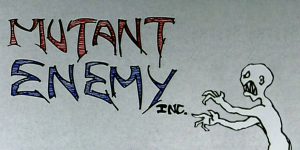More Hayles…
We are now in a position to understand mutation as a decisive event in the psycholinguistics of information. Mutation is the catastrophe in the pattern/randomness dialectic analogous to castration in the presence/absence dialectic. It marks a rupture of pattern so extreme  that the expectation of continuous replication can no longer be sustained. But as with castration, this only appears to be a disruption located at a specific moment. The randomness to which mutation testifies is implicit in the very idea of pattern, for only against the background of nonpattern can pattern emerge. Randomness is the contrasting term that allows pattern to be understood as such. The crisis named by mutation is as wide-ranging and pervasive in its import within the pattern/randomness dialectic as castration is within the tradition of presence/absence, for it is the visible mark that testifies to the continuing interplay of the dialectic between pattern and randomness, replication and variation, expectation and surprise. (48)
that the expectation of continuous replication can no longer be sustained. But as with castration, this only appears to be a disruption located at a specific moment. The randomness to which mutation testifies is implicit in the very idea of pattern, for only against the background of nonpattern can pattern emerge. Randomness is the contrasting term that allows pattern to be understood as such. The crisis named by mutation is as wide-ranging and pervasive in its import within the pattern/randomness dialectic as castration is within the tradition of presence/absence, for it is the visible mark that testifies to the continuing interplay of the dialectic between pattern and randomness, replication and variation, expectation and surprise. (48)
Orange is the New Black. Mutation is the new Castration. Maybe in 20 years, that joke would be mainstream enough so that Netflix could name a series that too. (Or maybe it wouldn’t take 20 years for that to be funny–seems like culture moves faster in both directions now.)
This is going to be a short post, but I would like everyone to think about how “mutation is the new castration”–assuming that you have some knowledge of what Hayles is talking about. If not, review this. Hayles does a good job of describing the difference between Lacan’s “presence/absence” and Freud’s. Modern pop culture is fairly obsessed with mutation, so it should not be very difficult.